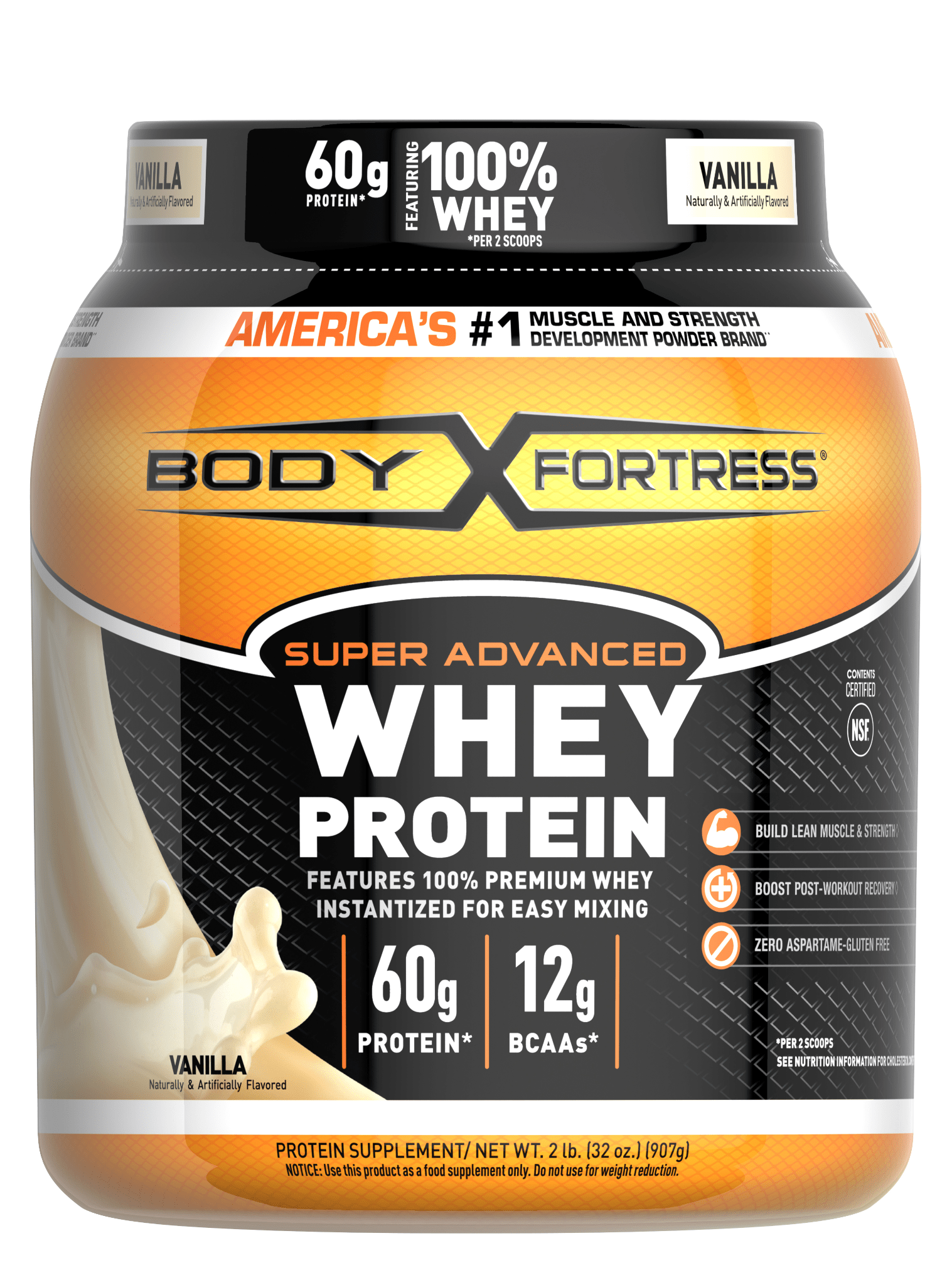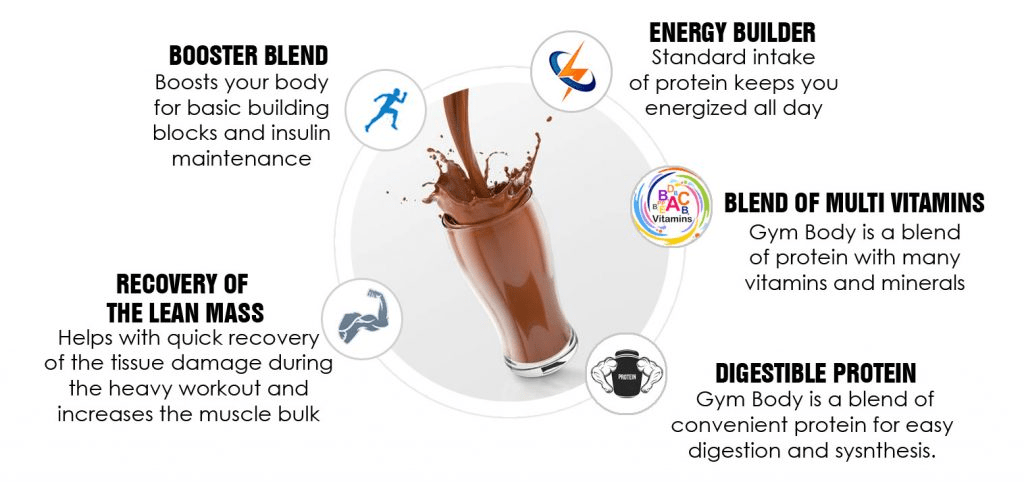
Protein is perhaps the most important nutritional substance for building muscle mass and leading a healthy lifestyle. With protein as the foundation, bodybuilders can use protein powder as a supplement in order to help them meet their protein requirements. Whey protein is one of the top protein sources that are used by bodybuilders.1 Bodybuilders can find protein in many different places; protein shakes, protein bars, and protein supplements are just a few options for them to select from. But how much should bodybuilders really take of protein?
When a new customer comes into a fitness supply store, they are usually bombarded by sales representatives who try to get them to buy all the latest new products. The sales rep may point to whey protein powder as a new product line that has just come out, or they may point to an upcoming viral video that has everyone talking about this amazing new product line. If you are a bodybuilder then you know how important protein is, in most cases, you need a protein shake or two every day in order to meet your daily requirement. It would be pointless to spend hundreds of dollars on new protein product lines when there are some simple and cost-effective products that work just as well.
One of the key advantages of whey protein powder for bodybuilders is that it is packed with essential amino acids. One of the most important amino acids for bodybuilders is glutamine, and this amino acid can also be found in whey protein.2 Many people don’t even know that they need glutamine in their diet; if you don’t supply the body with essential amino acids then you become susceptible to illness. Bodybuilders often take glutamine to help replenish the muscles lost during intense exercise.
What is Whey Protein Powder?
Whey protein powders are a favorite ingredient in many protein shakes and other protein drinks because of their absorption rate and convenience. However, whey protein powder can also have side effects if taken in large quantities or for a long period of time.3
Protein is what makes you grow stronger and helps make your bones stronger. If you do not get enough protein every day, then you will notice that your body grows weaker over time. Protein is the building block of all of your cells, so including protein in your diet is important for maintaining good health.4
Whey protein powder is a supplement that can be consumed to help increase muscle mass and burn body fat. Whey protein has been shown to increase muscle strength, lean body tissue, and improve weight loss in overweight or obese adults. It’s also rich in BCAAs which are the building blocks of amino acids. Amino acids are necessary for the growth and repair of muscles as well as performance enhancement during exercise. In addition to all these benefits, whey protein powder is lactose-free making it an easy choice for those who don’t tolerate dairy products well. There are many different types of whey proteins available on the market so make sure you’re getting one with a good mix of quality ingredients like calcium, or vitamin D3.
What are the Benefits Of Whey Protein Powder?
Protein is an essential nutrient that our bodies need, however, we often take it in the wrong form. Whey protein is a complete protein that helps build muscle tissue. There are many ways to ingest protein, but the best way to increase the amount of protein you get is to consume it as a supplement. Protein supplements come in many different flavors and types, including protein drinks and protein shakes.
Whey protein is a great source of protein that is easy to digest. Because it is quickly digested, it is also a fast-acting protein that provides quick results when working out. When working out, your muscles are working at a maximum output level, so working out longer is not beneficial. Your muscles need to be stimulated for them to work harder, and protein provides this immediate stimulation. Whey protein helps provide you with essential amino acids that help with muscle building.5
Protein has many benefits, but there are some common concerns about its use that people might not be aware of. First of all, whey protein benefits people who are trying to lose weight. Most of us realize that a diet lacking protein is not good for us. This includes weight loss. However, the protein does not have to come from food. There are some very delicious beverages that contain nothing but whey protein nutrition facts and no calories.6
As a health supplement, whey protein can help boost your immune system. Since it is high in protein, it helps your body produce antibodies that help fight off viruses and germs. This can prevent the flu and even keep colds away for a few months, as long as you make sure to stay healthy. This supplement can also give you more energy to do your daily activities since it is an amino acid.7 More protein in your muscles actually means more energy, so working out more often with whey protein can help you lose weight faster and get back into shape.
Whey protein helps you build lean muscles. It not only boosts your immune system but also helps regulate your metabolism to burn calories more efficiently. This leads to more energy for more activities. If you combine whey protein with the right vitamins, you can get the full benefits of this nutrition supplement. You should make sure to get your daily recommended amounts of calcium, iron, protein, and calories if you want to maintain healthy bones and muscles.
What Are The Dangers Of Whey Protein Powder?
If you have been contemplating making the switch to a low-carb, high protein diet, you may have already considered what are the dangers of whey protein powder. After all, one of its primary benefits is the ability to offer your body the essential amino acids it needs to repair muscles and to function normally.8 In addition, this popular powder is an excellent source of what are called branched-chain amino acids, which are particularly important for those who are trying to maintain muscle mass and preserve healthy enzymes. But while these benefits make whey protein powder worth a look, you need to ask yourself whether or not there are any real dangers of whey protein powder.9
As with just about anything in life, what are the dangers of whey protein powder can be both good and bad – and sometimes very damaging to your health. For example, although protein is an essential element for building and repairing muscles, too much can actually do damage to your kidneys and liver. This is because when your body breaks down protein, it also releases a by-product called dehydroepiandrosterone (DHEA), which can block your liver and kidneys, leading to a form of endometriosis called endometrial hyperplasia. So, while they can be a terrific addition to a well-balanced, low-calorie diet, it’s best to stick with a lower-calorie and low-fat diet if you are going to supplement with protein.10
Of course, what are the dangers of whey protein powder aren’t just heart and kidney-related. These days, many athletes are mixing whey protein with other forms of powder in order to increase their energy, strength, and stamina. As always, it’s wise to consult your physician first before including whey in your diet. If you have any questions about what are the dangers of whey protein powder, talk to your doctor today.
Common Benefits Of Whey Protein For Bodybuilders
Is whey protein powder good for bodybuilders? Many people say yes. Bodybuilding is a competitive sport and one of the few ways to ensure that you are getting in that extra protein that is required to build muscle. If you don’t have the proper nutrition, then your body will not be able to build up muscle as quickly. Protein is essential for muscle building, so this is why whey protein powder is such a popular supplement amongst bodybuilders.
The first and most obvious benefit of whey protein powder is that it is high in protein. This means that bodybuilders can get all the nutrients they need without having to worry about counting grams of protein. There is a large variety of protein powders on the market, so this is something you can choose according to your preference. Some people prefer natural whey protein powders, while others prefer the ones that are easier to digest such as soy protein powder.11 It is recommended that you use natural whey protein powders because the ones that have artificial ingredients can cause various side effects such as stomach ache, gas, and bloating.
Another benefit of whey protein for bodybuilders is its ability to rapidly provide energy. This is particularly important when bodybuilders are trying to stay focused during intense bodybuilding exercises. When bodybuilders consume large amounts of protein immediately following a rigorous exercise, their body begins to run out of nutrients as quickly as it has consumed them, which can lead to negative consequences. Whey protein helps prevent these negative consequences by providing the bodybuilder with the nutrients they need immediately. This means that the bodybuilder can perform more reps and sets with each workout and can continue training without taking into consideration the effects of low levels of protein.12
Many people wonder if whey protein is harmful to bodybuilders and what they should do to avoid it. The answer is yes, but in small amounts. As previously mentioned, proteins are beneficial for bodybuilders in large quantities. They are also beneficial for dieters who are trying to lose weight. The reason dieters should take whey protein is that it is beneficial for weight loss and bodybuilding.
A dieter cannot simply count on whey protein alone to help them lose weight or build muscle. They need to incorporate physical fitness and nutrition into their everyday lives. In addition to whey protein, bodybuilders need to eat a balanced diet that is packed full of fresh vegetables and fruits. This type of nutrition will go a long way in helping them reach their goals.
Image Credits
Walmart / 2021
Ethix / 2021
Youtube / 2021
1 “How much protein do you need every day? – Harvard Health.” 18 Jun. 2015, https://www.health.harvard.edu/blog/how-much-protein-do-you-need-every-day-201506188096 Accessed 21 Jul. 2021.
2 “Amino acids: MedlinePlus Medical Encyclopedia.” 2 Feb. 2019, https://medlineplus.gov/ency/article/002222.htm Accessed 21 Jul. 2021.
3 “Whey protein: Health benefits, side effects, and dangers.” https://www.medicalnewstoday.com/articles/263371 Accessed 21 Jul. 2021.
4 “Whey protein – Mayo Clinic.” https://www.mayoclinic.org/drugs-supplements-whey-protein/art-20363344 Accessed 21 Jul. 2021.
5 “Whey Protein 101: The Ultimate Beginner’s Guide – Healthline.” https://www.healthline.com/nutrition/whey-protein-101 Accessed 21 Jul. 2021.
6 “10 Evidence-Based Health Benefits of Whey Protein – Healthline.” 12 Jun. 2017, https://www.healthline.com/nutrition/10-health-benefits-of-whey-protein Accessed 21 Jul. 2021.
7 “WHEY PROTEIN: Overview, Uses, Side Effects, Precautions ….” https://www.webmd.com/vitamins/ai/ingredientmono-833/whey-protein Accessed 21 Jul. 2021.
8 “The hidden dangers of protein powders – Harvard Health.” https://www.health.harvard.edu/staying-healthy/the-hidden-dangers-of-protein-powders Accessed 21 Jul. 2021.
9 “Whey protein: Health benefits, side effects, and dangers.” https://www.medicalnewstoday.com/articles/263371 Accessed 21 Jul. 2021.
10 “The Harmful Side Effects of Whey Protein – Switch4Good.” 5 Aug. 2020, https://switch4good.org/harmful-side-effects-whey-protein/ Accessed 21 Jul. 2021.
11 “Your Expert Guide To Whey Protein – Bodybuilding.com.” 27 May. 2021, https://www.bodybuilding.com/content/your-expert-guide-to-whey-protein.html Accessed 21 Jul. 2021.
12 “The Best (and Worst) Whey Protein Powders | Muscle & Fitness.” https://www.muscleandfitness.com/supplements/build-muscle/best-and-worst-whey-protein-powders/ Accessed 21 Jul. 2021.



